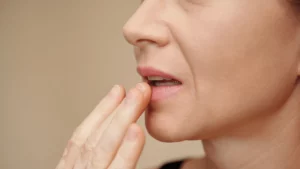Diabetes comes with its own set of challenges, and one often overlooked yet prevalent issue is dry mouth. The persistent sensation of a parched oral cavity can be not only uncomfortable but also detrimental to oral health. In individuals with diabetes, dry mouth can be a common symptom, often linked to fluctuating blood sugar levels and other diabetes-related factors. In this blog, we will explore the causes and delve into practical and effective diabetes dry mouth treatment strategies to help you find relief and maintain optimal oral health.
Contents
Why Do Diabetics Get Dry Mouth?
 Dry mouth, also known as xerostomia, is a common issue for people with diabetes. There are several reasons why diabetics may experience dry mouth:
Dry mouth, also known as xerostomia, is a common issue for people with diabetes. There are several reasons why diabetics may experience dry mouth:
- Fluctuations in Blood Sugar Levels: Uncontrolled or poorly managed diabetes often leads to fluctuating blood sugar levels. High blood sugar levels can result in dehydration. This leads to reduced saliva production and contributes to dry mouth.
- Neuropathy: Diabetes can cause nerve damage, a condition known as diabetic neuropathy. The nerves that stimulate saliva production may be affected. Further, this results in decreased saliva flow and the sensation of dry mouth.
- Medications: Many individuals with diabetes take medications to manage their condition. Some of these medications, including certain antihypertensive drugs, diuretics, and antihistamines, can cause dry mouth as a side effect.
- Dehydration: Elevated blood sugar levels can cause increased urination, leading to dehydration. Dehydration can contribute to dry mouth as the body may not have enough fluids to produce an adequate amount of saliva.
- Autoimmune Conditions: Diabetes is an autoimmune disease, and some individuals with diabetes may also have autoimmune conditions affecting the salivary glands. This can lead to decreased saliva production and, consequently, dry mouth.
- Poor Oral Hygiene: Individuals with diabetes may be more susceptible to gum disease and other oral health issues. Poor oral hygiene can exacerbate dry mouth symptoms, as the buildup of bacteria in the mouth may further compromise saliva production.
People with diabetes work closely with their healthcare team to manage their blood sugar levels effectively, address any medication-related concerns, and maintain good oral hygiene practices. Dental check-ups and communication with healthcare professionals can help identify and manage dry mouth symptoms to prevent complications and ensure overall oral health.
What Are Some Effective Diabetes Dry Mouth Treatment Options?
Diabetes dry mouth treatment involves a combination of lifestyle adjustments, oral care practices, and addressing underlying factors. Here are some effective treatment options:
Stay Hydrated
Adequate hydration is crucial for combating dry mouth. Individuals with diabetes should prioritize drinking plenty of water throughout the day to maintain optimal fluid levels. Water helps alleviate dehydration, a common contributor to reduced saliva production. Limiting the consumption of caffeinated and alcoholic beverages is also advisable, as they can contribute to dehydration.
Manage Blood Sugar Levels
Consistent blood sugar management is essential for preventing fluctuations that can lead to dry mouth. Adhering to a diabetes management plan, including regular monitoring, taking prescribed medications, following a balanced diet, and engaging in regular physical activity, can help stabilize blood sugar levels and reduce the risk of dry mouth.
Choose Saliva-Stimulating Products
 Sugar-free gum or lozenges can be effective in stimulating saliva production. Opt for products containing xylitol, a sugar substitute known to promote saliva flow and help prevent tooth decay. Sugar-free candies or mints can also be used to encourage saliva production without compromising oral health.
Sugar-free gum or lozenges can be effective in stimulating saliva production. Opt for products containing xylitol, a sugar substitute known to promote saliva flow and help prevent tooth decay. Sugar-free candies or mints can also be used to encourage saliva production without compromising oral health.
Oral Hygiene Routine
Maintaining a consistent oral hygiene routine is crucial for managing dry mouth. Brush your teeth at least twice a day using fluoride toothpaste to prevent tooth decay. Incorporate fluoride mouthwash into your routine to further protect oral health. In cases of persistent dry mouth, consider using a saliva substitute or artificial saliva product as recommended by your healthcare provider.
Humidify Your Environment
Using a humidifier in your bedroom, especially while sleeping, can add moisture to the air and alleviate dry mouth symptoms. This is particularly beneficial in dry climates where the natural humidity levels may be lower.
Modify Your Diet
Dietary adjustments can play a significant role in managing dry mouth. Including moisture-rich foods in your diet, such as watermelon, cucumber, and celery, can contribute to overall hydration. Conversely, it’s advisable to limit the intake of excessively salty or spicy foods, as they may contribute to dehydration.
Limit Caffeine and Alcohol
Both caffeine and alcohol can have dehydrating effects, exacerbating dry mouth symptoms. Limiting the consumption of these substances can help maintain adequate hydration and alleviate dry mouth.
Regular Dental Check-ups
Scheduling regular dental check-ups and cleanings is essential for monitoring oral health. Dentists can identify early signs of dry mouth-related issues, provide preventive care, and offer guidance on maintaining optimal oral hygiene practices.
Medication Review
Consult with your healthcare provider to review your medication regimen. If dry mouth is a known side effect of any prescribed medications, discuss potential alternatives or adjustments. It’s essential to balance the management of diabetes with minimizing side effects that may contribute to dry mouth.
Implementing these lifestyle adjustments and treatment strategies can significantly improve the management of dry mouth in individuals with diabetes, promoting better oral health and overall well-being. Always consult with your healthcare team for personalized advice based on your specific health needs.


 While the treatments for diabetes-related dry mouth are generally considered safe and effective, it’s important to be aware of potential risks and considerations. Here are some factors to keep in mind:
While the treatments for diabetes-related dry mouth are generally considered safe and effective, it’s important to be aware of potential risks and considerations. Here are some factors to keep in mind: